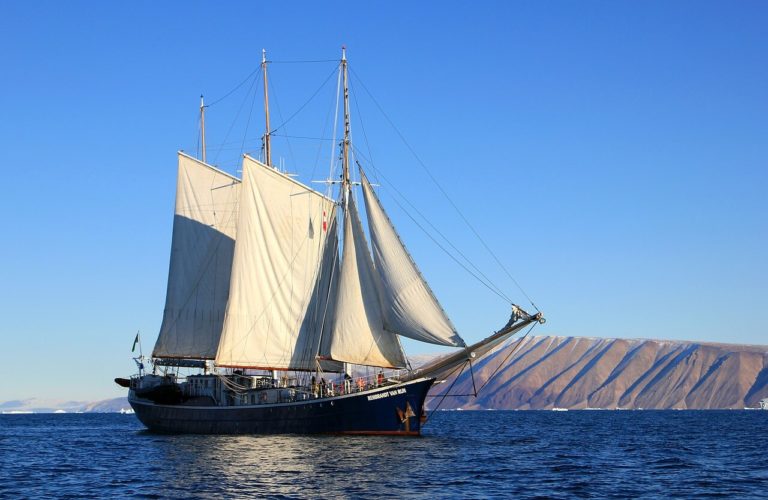GET IN TOUCH
Please contact us for more information. Our email is monitored seven days a week and we will get back to you shortly.

This is an article by Darren Williams, a founding partner of League and Williams. Darren has written and published over 100 articles on maritime law in Canada. This article was originally published by Anchor Publishing in February 2004.
Su•per•sti•tion: the belief that particular events happen in a way that cannot be explained by reason or science; the belief that particular events bring good or bad luck (Oxford Dictionary).
I learned at the age of 11 that opening a tin can upside down on a boat is a bad idea. When I scoffed at the explanation that it would bring bad luck, the Skipper fired me. “Wow, that really was bad luck”, I thought, in shock. When I was 15 we prepared to leave port on a Thursday evening, but we didn’t throw off our lines until 12:05am. The resulting fishing trip was a nightmarish week-long struggle with smashed gear, freezing rain and huge seas ending with the crew owing the boat for food, ice and diesel. I now know that you should never scorn the sea or your boat, and always mind your superstitions.
Marine superstitions have been around for tens of hundreds of years. There are thousands of different superstitions that vary depending on where you are, who you are, what industry you are in, and so on. Below are a few of the superstitions held by fishermen and mariners that I have met in the last 20 years, as well as my understanding of the origins of these superstitions. Of course, there are variations on those listed below, and there are many more superstitions that we cannot mention. Readers are encouraged to provide other superstitions and explanations to the address below.
Leaving port on a Friday is easily the most consistently applied superstition on the B.C. coast, and possibly abroad. It is thought that merchant and navy seamen developed this superstition in order to encourage the ship to stay in town for the most notorious night of the week in local watering holes.
Implying fat, slow movement, it is believed this word will insult the character of the ship, leading to disaster, break-down or generally poor performance of the vessel. That calling the ship a “pig” would have a negative effect on her personality should be obvious. I don’t imagine there exists a single female personality that would suffer lightly being called a “pig”.
Whistling brings the wind. While it may not bring bad-luck, whistling is believed to cause the wind to blow. In some circumstances wind can be good, but in most, crew members are discouraged from whistling. It is also considered bad etiquette to whistle on someone else’s boat – as it is not your property and life alone that you endanger.
Implying a sinister presence on the vessel, the origin of this superstition is unclear. Some fisherman, particularly trawlers, jested of the relevance of this superstition as the evil black briefcase became the general issue of fisheries’ observers in the mid-1990s.
This is a faux-superstition started by the cooks, masters of the galley. Really a matter of hygiene and good manners and not a real superstition at all, some crew members have been known to become mysteriously ill after insisting they place their hat on the galley table. “Strange”, says the cook.
Placing a hatch cover or manhole upside down is bad luck. There are various explanations. Upside down covers forebode of a capsized vessel. Practically speaking, all hatches and manholes should be in the sealed position while at sea in any event; to do otherwise is said to be bad practice. This superstition is known to have been modified on some vessels to prohibit buckets of water from being placed on the hatch cover – possibly symbolizing standing water over the hatch, a bad situation in any case.
If coffee mugs are hung on the galley or wheelhouse wall, they must be facing (open side) astern. This quirky belief is thought to originate from the same practice that was common and necessary for sailors prior to closed-hull construction of vessels. Working and eating out in the open, your coffee cup would fill with salt water if it was not hanging astern.
The association between flowers and funerals is most likely what makes having flowers on a boat to be unlucky.
Any can opened upside down must be thrown out without consuming its contents. To do otherwise is bad luck. The rational basis for this is that when canned food became available on vessels, around 1810, the early canning technology allowed some air into the cans. Some of these tin cans sat on vessels for so long that opening them the wrong way might expose the diner to eating corroded tin, a mild poison. Hypothetically, this superstition would require us to place all our cans in the locker upside down (so they can be opened upright with the poison side down). However, canning technology has eliminated air pockets that once used to be more common, and we no longer face this danger.
The cultural significance of superstitions is perhaps nowhere more followed and respected than in the fishing and marine industries. The majority of marine superstitions are just that, irrational beliefs. A few marine superstitions, like that a ship should never sail on a Friday, are the result of centuries of pressure by seaman. Yet others, like never turning a hatch cover upside down, are the result of common sense and good seamanship. If you do not believe in superstitions, respect them for their contribution to the richness that is our maritime culture, and never, ever, open a can upside down.
Darren Williams is a marine lawyer with League and Williams in Victoria BC.